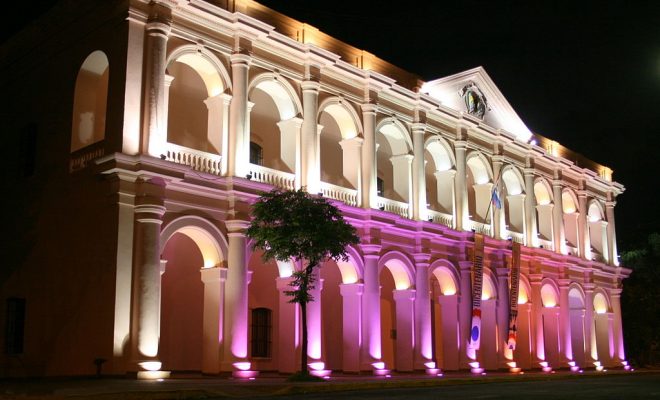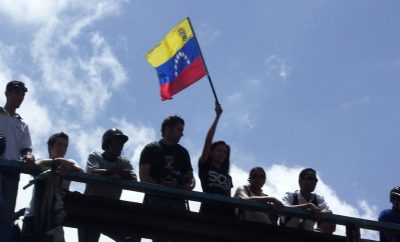 "Cabildo" Courtesy of Felipe Méndez : License (CC BY-SA 3.0)
"Cabildo" Courtesy of Felipe Méndez : License (CC BY-SA 3.0)
World
Is Paraguay on the Verge of Becoming a Dictatorship?
Paraguay’s Senate recently took a step toward amending a constitutional rule that restricts presidents from holding more than one five-year term in office. President Horacio Cartes has long been pushing for the amendment and has formed a pluralistic coalition with some of his traditional political rivals.
Nonetheless, many in Paraguay’s Congress and a vast majority of the public oppose the amendment for fear that it might allow yet another dictatorship to take hold of the country. While unpopular, the amendment seems inevitable, though the political consequences of the change are unknown.
Of Paraguay’s 45 senators, 25 met for Tuesday’s charged special session in which they pushed through procedural changes that will make it easier to amend the constitution. President of the Senate Roberto Acevedo was not present at the meeting. Instead, a pro-Cartes senator took to the microphone, declared himself Senate President, and called for a vote.
By a show of hands, legislators lowered the number of votes needed before proposals could be put before Congress and restricted the Senate President’s power to strike down legislation. These procedural changes come seven months after the legislature successfully defeated a bill that would have ended the one-term limit.
As legislators met inside the El Cabildo, Paraguay’s congressional building, riot police mobilized outside and protesters amassed in the streets. Numerous politicians, including many from the president’s own Colorado Party, denounced the proposed amendment as well as the irregular means by which legislators have pursued the proposal.
Paraguay’s Catholic Bishops came out against the Senate’s vote, arguing it demonstrated an “absolute lack of consideration and respect for the democratic institution.” Though the clergymen urged Paraguayans to “reflect, calmly and reasonably, on what happened,” many fear the country might once again fall under dictatorial rule. This concern is justified considering Paraguay’s history with authoritarian rule.
A New Era of Dictatorship?
After regaining power from the Liberal Party in 1947, the Colorado Party ruled Paraguay as a one-party dictatorship for six decades. While opposition parties were technically legalized in 1962, Alfredo Stroessner led the party and country as a military dictator until 1989, when a faction of the Colorado Party staged a coup and implemented reforms.
In spite of these reforms, the right-wing party retained power for another two decades until Fernando Lugo won the presidency in 2008. Now, a Colorado president and the man who ended six decades of Colorado rule are working together to amend the constitution with the intention of facing off against one another in the 2018 elections.
The highly controversial battle does not fall along party lines. Supporters for the amendment include members from all three major parties. Pro-Cartes members of the right-wing Colorado Party have aligned with a faction of the center-right Liberal Party and the bulk of the center-left Frente Guasú party. Though this three-party coalition is working to pass the same constitutional amendment, their motivations differ.
The pro-Cartes faction of the Colorado Party hopes to see the current president re-elected. Some lawmakers in the Frente Guasú party want to amend the constitution so former President (and leader of Frente Guasú) Lugo can run against Cartes in 2018. Lugo was impeached in 2012, and under the current constitution, is barred from running again.
Despite its wide congressional support, the amendment is extremely unpopular among Paraguayans. A recent poll shows that 77 percent of Paraguayans oppose the amendment. Aside from the fact that many feel the government’s fixation with amending the constitution has distracted from more important issues, Paraguayans seem to recognize the term limit is intended to safeguard against the re-occurrence of a Stroessner-style regime.
Could Lugo Win Again?
Though the public overwhelmingly opposes the amendment, polls show that were the election held tomorrow, Lugo would win over 50 percent of the vote, while Cartes would win less than 12 percent. Lugo is the only candidate to defeat the Colorado Party in decades and remains popular with the electorate. Were Lugo to run in 2018, his win could potentially weaken the Colorado Party’s traditional hegemony and embolden voices opposed to the status quo.
While allowing Lugo to run again could help normalize the peaceful exchange of power between parties, the strength of the Colorado Party must not be underestimated. While Lugo won the presidency in 2008, he did not complete his term. A year before his term expired, Colorado and Liberal members of Congress formed a coalition and impeached Lugo. The conditions for his impeachment where somewhat dubious and many Latin American leaders condemned the decision. Unless Lugo’s Frente Guasú is able to secure a strong contingency in Congress, there is no guarantee that his prospective second term won’t end up like his first.
Recent developments seem to suggest a constitutional amendment allowing multiple terms is inevitable. While the amendment could see a popular opposition voice return to the highest office in the land, it may also reopen a door that was locked shut, bringing a new era of dictatorship to Paraguay.








Comments